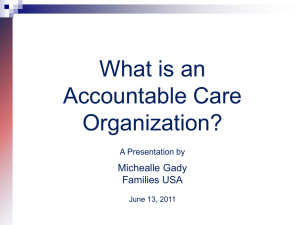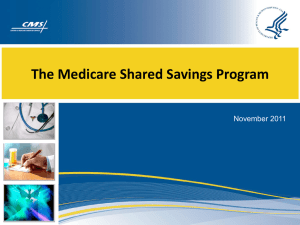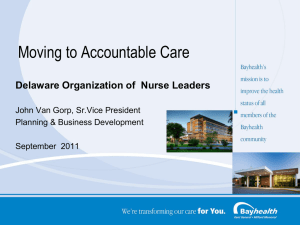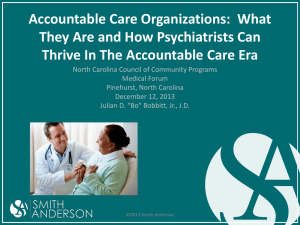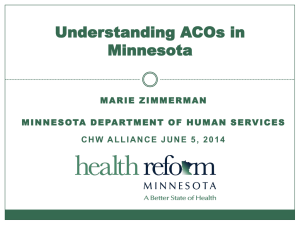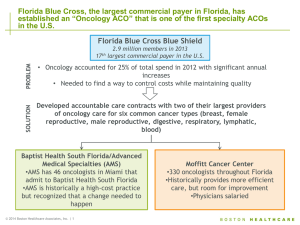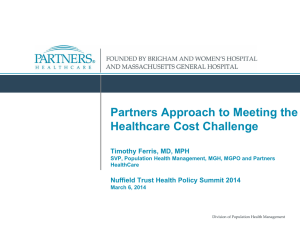MSSP training - Providence Health & Services
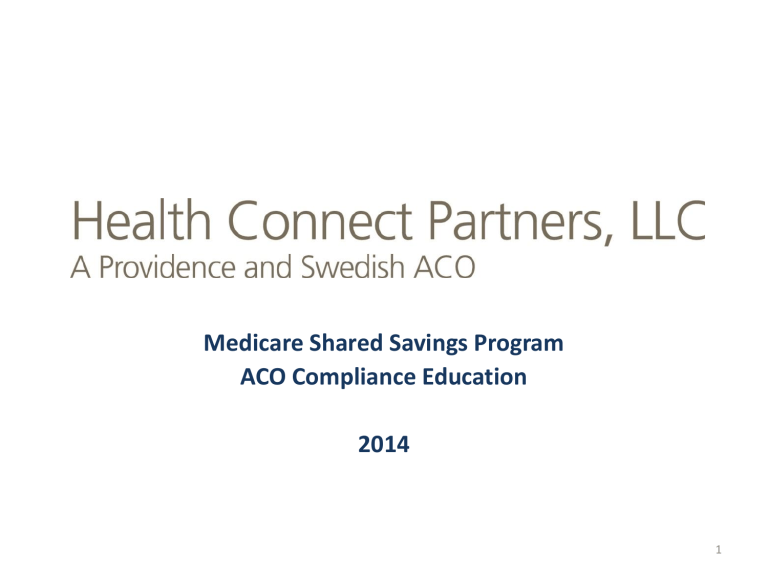
Medicare Shared Savings Program
ACO Compliance Education
2014
1
Q: Why do I have to complete ACO compliance education? I already receive compliance training from Providence/Swedish.
A: Your organization has chosen to participate in the Medicare Shared Savings
Program (MSSP), which means that you are now participating in the MSSP too.
There are a few things you need to know to ensure compliance with the
Center for Medicare and Medicaid Services (CMS) requirements for MSSP
Accountable Care Organizations (ACOs). This education module will highlight them for you.
2
Q: What am I going to learn and does it really matter?
A: This compliance education module will go through:
– MSSP ACO regulatory requirements
– Reporting compliance, fraud, waste and abuse issues
– Who to contact with questions or concerns
And yes, compliance matters. Non-compliance could result in:
– Termination of our ACO’s contract with CMS,
– Repayment of substantial amounts of funding, and possibly
– Civil and/or criminal penalties for serious violations.
3
Q: What am I going to learn and does it really matter? (continued)
In fact, compliance matters so much that Health Connect Partners has its own compliance program, structured around the elements recommended by the
Dept. of Health and Human Services Office of the Inspector General. The elements are outlined in the HCP Compliance Program Description and include:
ACO Standards of Conduct
Written policies and procedures
Dedicated compliance officers
Training and education
Responses to, and prevention of, potential compliance problems
Compliance committees
Disciplinary standards
Auditing and monitoring of risks
Lines of communication to report compliance concerns (discussed more below)
4
Q: What is a Medicare Shared Savings Program Accountable Care Organization?
A: MSSP ACOs are groups of doctors and other health care providers who voluntarily work together to coordinate care for Medicare fee-for-service beneficiaries. MSSP ACOs share in any savings that result from providing beneficiaries with coordinated, high quality care.
MSSP ACOs are not managed care organizations, do not use closed networks of providers, and do not limit a Medicare beneficiary's so-called “free choice” of
Medicare providers.
MSSP ACOs differ from other ACOs in that they must meet specific requirements from CMS. Other types of ACOs (e.g. the Providence-Swedish Health Alliance) operate under different legal standards and requirements and are not covered in this compliance education.
5
Q: If we are responsible for coordinating a patient’s care across the continuum, then can we limit referrals to only other ACO providers?
A: In general, no. The MSSP is not a managed care or closed network program. This means that Medicare fee-for-service patients must be able to seek care from providers that are outside of the ACO.
However, employed or contracted physicians may limit referrals in certain circumstances that are discussed next.
Please see the MSSP ACO Prohibited Referrals Policy and Procedure ( ACO-02-HCP )
6
Q: If we are responsible for coordinating a patient’s care across the continuum, then can we limit referrals to only other ACO providers?
(continued)
Employed or contracted providers may limit referrals when acting within the scope of their contract, as long as:
– The referring provider is free to make a referral based on the patient’s preference; or
– The patient’s insurer determines the provider; or
– A referral within the ACO would not be in the patient’s best medical interests.
Example: A hospital may require its employees to refer patients to the hospital’s imaging center as long as the referring employee is free to honor patient choice, insurer requirements, and the best interests of the patient.
7
Q: Since the ACO is responsible for coordinating a patient’s care across the continuum, can we try to encourage beneficiaries to seek care from the ACO by providing free or discounted services?
A: Sometimes, and only under certain circumstances. The federal government has put limitations on the strategies ACOs can use to encourage patients to seek care from the ACO.
We’ll start with what ACOs may not do, then we’ll go over what ACOs may do.
Please see the MSSP ACO Beneficiary Inducements Policy and Procedure ( ACO-01-HCP )
8
Q: Since the ACO is responsible for coordinating a patient’s care across the continuum, can we try to encourage beneficiaries to seek care from the ACO by providing free or discounted services? (continued)
ACOs may not give beneficiaries cash or items unrelated to health care under any circumstances.
Examples of prohibited items include sporting event tickets or gift certificates for non-health care related retail items.
ACOs may not give beneficiaries items or services for the purposes of:
– Rewarding them for receiving services from the ACO, or
– Persuading them to remain assigned to the ACO.
9
Q: Since the ACO is responsible for coordinating a patient’s care across the continuum, can we try to encourage beneficiaries to seek care from the ACO by providing free or discounted services? (continued)
ACOs may give beneficiaries free or below market value items or services for the purposes of care coordination or encouraging health awareness.
However, these items or services must be:
“In-kind” (i.e. goods, commodities, and services, but not cash);
Reasonably connected to medical care; and either
Preventive care items or services, or
Intended to advance one or more of the following clinical goals:
– Adherence to a treatment (including a drug treatment) regime;
– Adherence to a follow-up care plan; and/or
– Management of a chronic disease or condition.
10
Q: Since the ACO is responsible for coordinating a patient’s care across the continuum, can we try to encourage beneficiaries to seek care from the ACO by providing free or discounted services? (continued)
Example: An ACO may give blood pressure monitors to patients with hypertension to encourage regular blood pressure monitoring and to educate and engage beneficiaries to be more proactive in their disease management.
Example: An ACO may not waive or reduce Medicare copayments or deductibles because those are financial incentives and are not “in-kind.”
11
Q: Since the ACO is responsible for coordinating a patient’s care across the continuum, can we try to encourage beneficiaries to seek care from the ACO by providing free or discounted services? (continued)
Beneficiaries must be able to keep any items received after the ACO’s contract with CMS ends. Beneficiaries must also be able to continue receiving services that are in progress when the ACO’s contract ends.
Examples:
– A post-surgical patient receiving free home visits to coordinate in-home care during the recovery period;
– A hypertensive patient using home telehealth monitoring of blood pressure;
– A beneficiary receiving services halfway through a normal course of smoking cessation treatment.
12
Q: Are there limitations on advertising or promoting our ACO and it’s benefits to patients?
A: Yes- CMS has put fairly stringent limitations on what are broadly referred to as “marketing materials.”
“Marketing materials” include brochures, websites, advertisements, outreach events, letters to beneficiaries, social media, etc.
Examples of things that are NOT “marketing materials” include anything that does not contain information about the ACO, billing/claims documents, materials related to health conditions, provider referrals, etc.
13
Q: Are there limitations on advertising or promoting our ACO and it’s benefits to patients? (continued)
In general:
Marketing materials must be submitted to CMS for pre-approval;
ACOs must use CMS templates for materials when they are available; and
CMS templates can not be altered in any way.
There are too many restrictions on “marketing materials” to be adequately covered here, so please contact the ACO Regulatory Compliance Department before creating, modifying, or distributing any ACO marketing materials.
14
Q: Are there limitations on advertising or promoting our ACO and it’s benefits to patients? (continued)
ACO-created materials may not contain:
– Language suggesting that beneficiaries are required to see providers only within the ACO or are in any way prohibited from seeing providers outside of the ACO;
– Language suggesting that beneficiaries enroll or are participating in ACOs; wording should be clear that it is the provider, not the beneficiary, that has chosen to participate in the ACO;
– Language suggesting CMS endorses one ACO over another;
– Language suggesting an ACO is in any way superior to other ACOs, or other types of ACOs, or that the providers participating in the ACO are superior to other providers participating in other ACOs or CMS initiatives.
15
Q: Are there limitations on advertising or promoting our ACO and it’s benefits to patients? (continued)
There are also some prohibited terms and phrases that may not be used in
ACO-created materials:
Prohibited Phrase/Term CMS’ Suggested Alternative
“Managed care” or “care management”
“Coordinated care” or “care coordination”
Beneficiaries “enroll” or “enrollment” Providers “participate”
“You have been selected to participate”
“Your provider has chosen to participate”
16
Q: Do we need to tell our patients about the ACO?
A: Yes, CMS has some beneficiary notification requirements:
– Beneficiaries must receive notice that their health care provider is participating in an ACO;
– Beneficiaries must be given the option to opt-out of some data sharing between CMS and the ACO; and
– Beneficiaries must be given the option to change their data sharing preferences at any time.
Since beneficiary notifications are “marketing materials,” Health Connect
Partners policies and procedures regarding beneficiary notification must be followed. Please see the MSSP ACO Beneficiary Data Sharing Notification
Policy and Procedure (ACO-05-HCP).
17
Q: Do we need to retain records regarding the ACO?
A: Yes. CMS requires that ACOs retain all records related to the ACO for a minimum of 10 years after the ACO agreement period has ended. Beyond the minimum 10-year requirement, you should follow your ministry/facility’s record retention policies and procedures.
Please see the Providence Records Retention & Disposal Policy and Procedure ( PROV-ICP-715 ).
18
Q: What if I suspect fraud, waste, or abuse in the ACO?
A: Everyone involved in the ACO has a duty to:
Comply with all statutory, regulatory, and other program requirements;
Report any violations of laws that you may be aware of; and
Follow Providence ACO Programs Standard of Conduct as well as your employer’s code of conduct
Your employer may not retaliate against you for making a good faith effort in reporting suspected FWA.
Please see the Prohibited Payments and Referrals Policy and Procedure ( ACO-12-SHD ) and Non-Retaliation and
Non-Retribution Policy and Procedure ( ACO-10-SHD ).
19
Q: Remind me, what are fraud, waste and abuse?
A: Generally speaking:
– Fraud: intentionally submitting false information to the government in order to get money/benefit
– Waste: Health care spending that can be eliminated without reducing quality of care
– Abuse: unknowingly and/or unintentionally misrepresenting facts to obtain payment for which there is no legal entitlement
Q: They seem similar- what’s the difference between the three?
A: Primarily intent and knowledge - Fraud requires intent to obtain payment and knowledge that the actions are wrong. Waste and abuse may involve improper payments, but do not require intent and knowledge.
You do not have to understand the differences, and often the lines between them are blurry. Just make sure to report your concerns (“how to report” is discussed later).
20
Q: What are the potential penalties for fraud, waste and abuse?
A: The actual penalty depends on the violation, but it could result in:
– Civil monetary penalties,
– Criminal conviction/fines,
– Civil prosecution,
– Imprisonment,
– Loss of provider license, and/or
– Exclusion from federal health care programs.
21
Q: How do I report suspected non-compliance or fraud, waste, or abuse?
Also, where do I find more information on the MSSP ACO requirements?
A: You have several choices:
1.
ACO Regulatory Compliance Program documents (including policies and procedures, Standards of Conduct, CMS regulations, etc.)
2.
Contact the ACO Regulatory Compliance Department 425-525-3739 or kelly.robberson@providence.org
3.
Call the ACO Compliance Line (callers may remain anonymous) at
888-233-4101
4.
Call the Providence Integrity Line 888-294-8455
22
Congratulations – you have completed the 2014 ACO Compliance
Education module!
23
